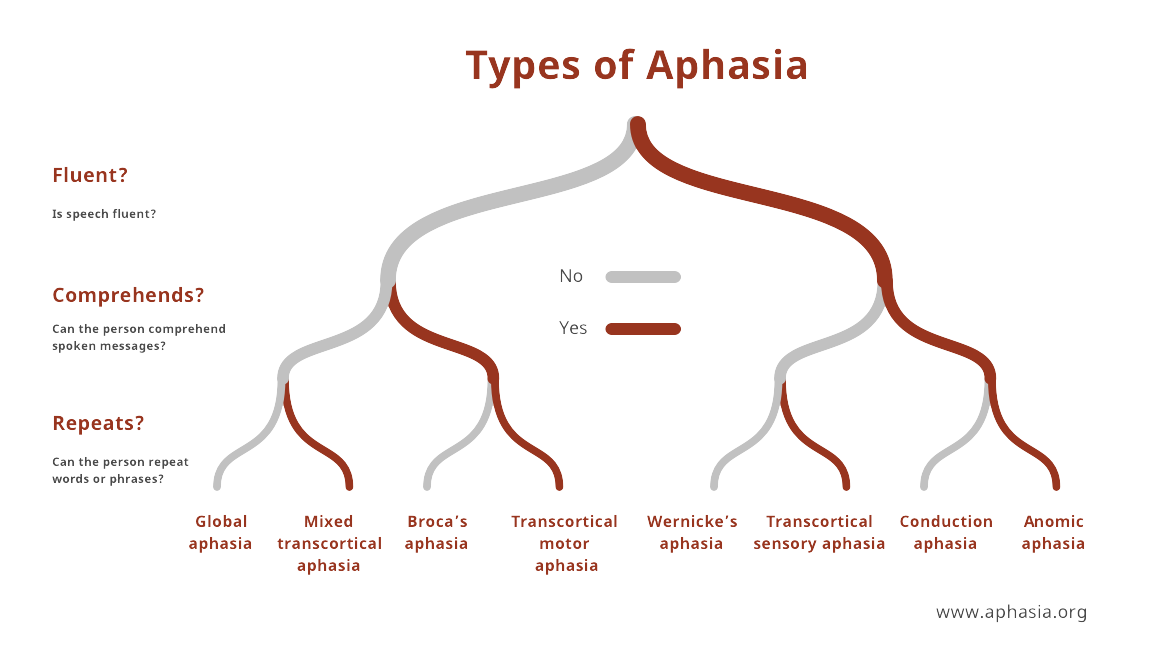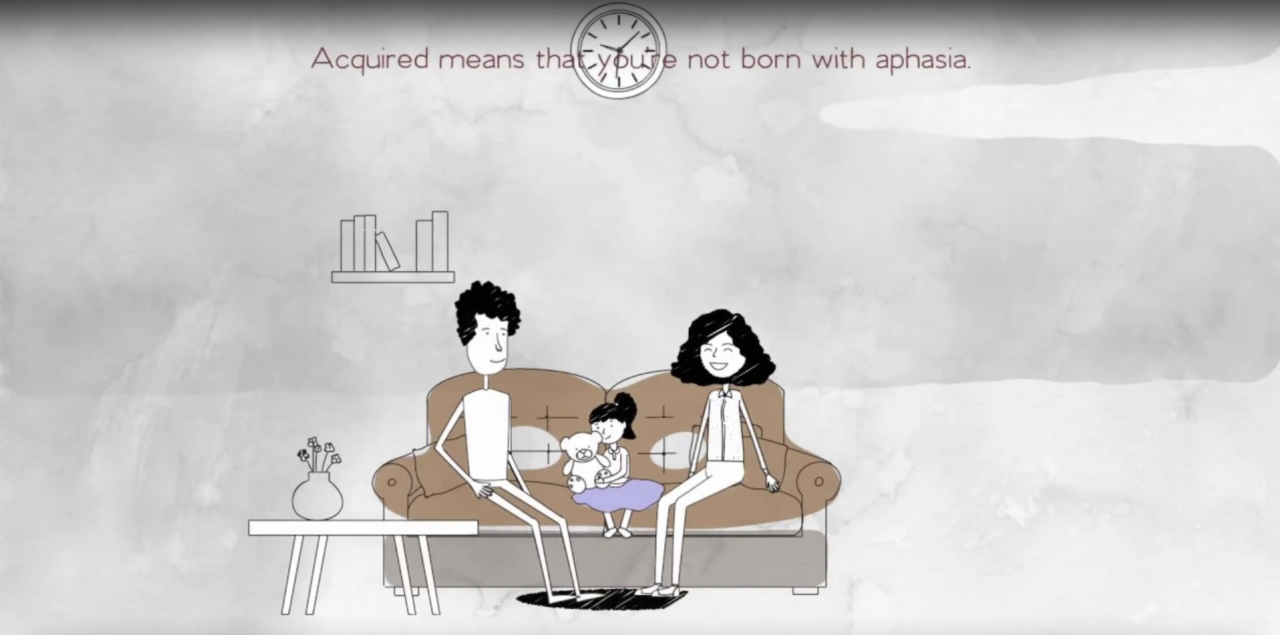
APHASIA (Uh-Fay-Zhuh) is a result of a STROKE or BRAIN INJURY, and affects a person’s ability to communicate. It is important to remember that you are still a competent adult, you know what you want to say, you can make your own decisions and you are not deaf. Aphasia usually comes on suddenly from a stroke or brain injury. But in rare cases it may develop gradually. This is called Primary Progressive Aphasia (PPA). If you have aphasia, you may find it hard to: TALK, LISTEN/UNDERSTAND OTHERS WHEN THEY SPEAK, READ, WRITE, USE NUMBERS AND DO CALCULATIONS.
Aphasia is an impairment of language, affecting the production or comprehension of speech and the ability to read or write. Aphasia is always due to injury to the brain-most commonly from a stroke, particularly in older individuals. But brain injuries resulting in aphasia may also arise from head trauma, from brain tumors, or from infections.
Aphasia can be so severe as to make communication with the patient almost impossible, or it can be very mild. It may affect mainly a single aspect of language use, such as the ability to retrieve the names of objects, or the ability to put words together into sentences, or the ability to read. More commonly, however, multiple aspects of communication are impaired, while some channels remain accessible for a limited exchange of information.
It is the job of the professional to determine the amount of function available in each of the channels for the comprehension of language, and to assess the possibility that treatment might enhance the use of the channels that are available.
Below you can find more information on the different types of aphasia such as Global, Broca’s, Wernicke’s, Primary Progressive, Anomic, and Mixed Non-fluent aphasia.
In addition to the foregoing syndromes that are seen repeatedly by speech clinicians, there are many other possible combinations of deficits that do not exactly fit into these categories. Some of the components of a complex aphasia syndrome may also occur in isolation. This may be the case for disorders of reading (alexia) or disorders affecting both reading and writing (alexia and agraphia), following a stroke. Severe impairments of calculation often accompany aphasia, yet in some instances patients retain excellent calculation in spite of the loss of language.
Over a century of experience with the study of aphasia has taught us that particular components of language may be particularly damaged in some individuals. We have also learned to recognize different types or patterns of aphasia that correspond to the location of the brain injury in the individual case. Some of the common types of aphasia are:

Watch the first video in our series of aphasia tips and info.

This is the most severe form of aphasia, and is applied to patients who can produce few recognizable words and understand little or no spoken language. Persons with Global Aphasia can neither read nor write. Global aphasia may often be seen immediately after the patient has suffered a stroke and it may rapidly improve if the damage has not been too extensive. However, with greater brain damage, severe and lasting disability may result.
Broca's aphasia ('non-fluent aphasia')
In this form of aphasia, speech output is severely reduced and is limited mainly to short utterances of less than four words. Vocabulary access is limited and the formation of sounds by persons with Broca's aphasia is often laborious and clumsy. The person may understand speech relatively well and be able to read, but be limited in writing. Broca's aphasia is often referred to as a 'non fluent aphasia' because of the halting and effortful quality of speech.
Mixed non-fluent aphasia
This term is applied to patients who have sparse and effortful speech, resembling severe Broca's aphasia. However, unlike persons with Broca's aphasia, they remain limited in their comprehension of speech and do not read or write beyond an elementary level.
Wernicke's aphasia ('fluent aphasia')
In this form of aphasia the ability to grasp the meaning of spoken words is chiefly impaired, while the ease of producing connected speech is not much affected. Therefore Wernicke's aphasia is referred to as a 'fluent aphasia.' However, speech is far from normal. Sentences do not hang together and irrelevant words intrude-sometimes to the point of jargon, in severe cases. Reading and writing are often severely impaired.
This term is applied to persons who are left with a persistent inability to supply the words for the very things they want to talk about-particularly the significant nouns and verbs. As a result their speech, while fluent in grammatical form and output is full of vague circumlocutions and expressions of frustration. They understand speech well, and in most cases, read adequately. Difficulty finding words is as evident in writing as in speech.
Primary Progressive Aphasia
Primary Progressive Aphasia (PPA) is a neurological syndrome in which language capabilities become slowly and progressively impaired. Unlike other forms of aphasia that result from stroke or brain injury, PPA is caused by neurodegenerative diseases, such as Alzheimer's Disease or Frontotemporal Lobar Degeneration. PPA results from deterioration of brain tissue important for speech and language. Although the first symptoms are problems with speech and language, other problems associated with the underlying disease, such as memory loss, often occur later.
Aphasia is an acquired communication disorder that impairs a person’s ability to process language, but does not affect intelligence. Aphasia impairs the ability to speak and understand others, and most people with aphasia experience difficulty reading and writing. The diagnosis of aphasia does NOT imply a person has a mental illness or impairment in intelligence.
What Causes Aphasia? toggle accordionThe most common cause of aphasia is stroke (about 25-40% of stroke survivors acquire aphasia). It can also result from head injury, brain tumor or other neurological causes.
How Common is Aphasia? toggle accordionAphasia affects about two million Americans and is more common than Parkinson’s Disease, cerebral palsy or muscular dystrophy. Nearly 180,000 Americans acquire the disorder each year. However, most people have never heard of it.
Who Acquires Aphasia? toggle accordionWhile aphasia is most common among older people, it can occur in people of all ages, races, nationalities and gender.
Can a Person Have Aphasia Without Having a Physical Disability? toggle accordionYes, but many people with aphasia also have weakness or paralysis of their right leg and right arm. When a person acquires aphasia it is usually due to damage on the left side of the brain, which controls movements on the right side of the body.
Can People Who Have Aphasia Return to Their Jobs? toggle accordionSometimes. Since most jobs require speech and language skills, aphasia can make some types of work difficult. Individuals with mild or even moderate aphasia are sometimes able to work, but they may have to change jobs.
How Long Does it Take to Recover from Aphasia? toggle accordionIf the symptoms of aphasia last longer than two or three months after a stroke, a complete recovery is unlikely. However, it is important to note that some people continue to improve over a period of years and even decades. Improvement is a slow process that usually involves both helping the individual and family understand the nature of aphasia and learning compensatory strategies for communicating.
How Do You Communicate With a Person With Aphasia? toggle accordion Does Aphasia Affect a Person’s Intelligence? toggle accordionNO. A person with aphasia may have difficulty retrieving words and names, but the person’s intelligence is basically intact. Aphasia is not like Alzheimer’s disease; for people with aphasia it is the ability to access ideas and thoughts through language – not the ideas and thoughts themselves- that is disrupted. But because people with aphasia have difficulty communicating, it is often confused with other conditions.
Are All Cases of Aphasia Alike? toggle accordionNo. There are many types of aphasia. Some people have difficulty speaking while others may struggle to follow a conversation. In some people, aphasia is fairly mild and you might not notice it right away. In other cases, it can be very severe, affecting speaking, writing, reading, and listening. While specific symptoms can vary greatly, what all people with aphasia have in common are difficulties in communicating.